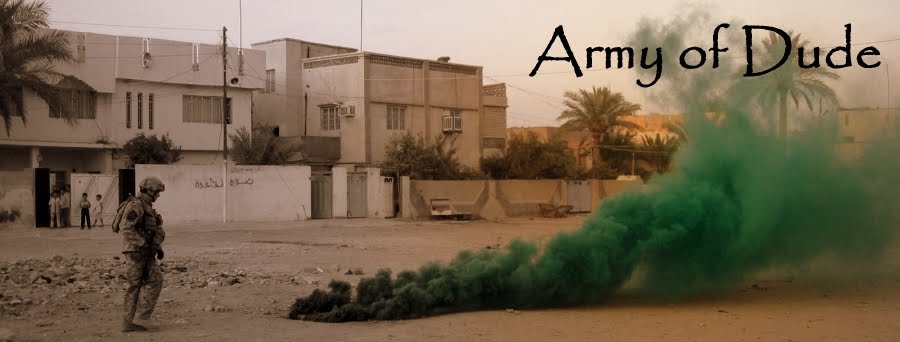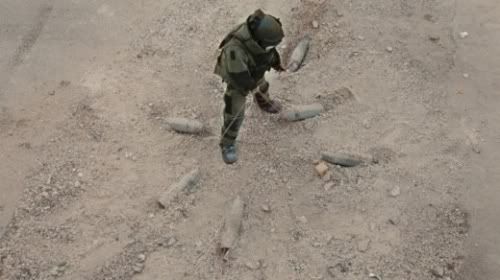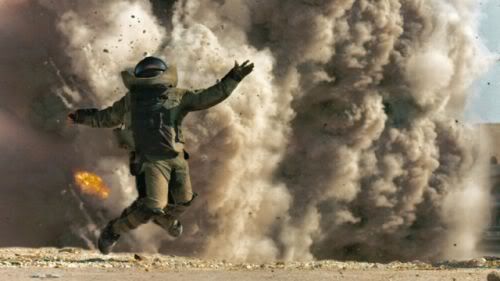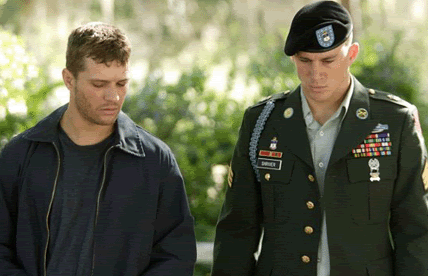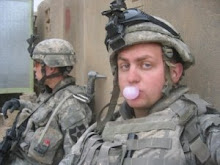Enjoying a good war movie after you've been there, done that requires a bit of finesse. The casual moviegoer doesn't watch closely for errors in rank, patches, vernacular or procedure. They simply want to be entertained for a couple of hours. A veteran, conversely, is tortured with an onslaught of technical blunders that the average viewer will miss. Filmmakers must walk a tightrope to appease both sides; technical and accurate enough for the discriminating military crowd but still accessible to viewers who don't know the difference between CAS and SAF. So far, no Iraq-themed movies have walked that fine line. The bar has been set ridiculously low;
Redacted, the reigning champ of tasteless war movies, makes
Stop Loss look like
A Bridge Too Far. But don't let the sad state of Iraq movies keep you away from the cineplex this week. Kathryn Bigelow's
The Hurt Locker is not without its narrative problems, but it's a solid and dramatic entry that can satisfy both sides of the fence.
The story follows a three man team of EOD (explosive ordnance disposal) techs in the final month of their deployment in Baghdad in 2004. The team is headed by SSG James (Jeremy Renner), a reckless cowboy that routinely puts his life and the lives of his men in constant danger. The movie's epitaph lingers on the screen long after the words fade.
War is a drug. It is clear from James' first mission that he feeds off the adrenaline rush of bomb defusing at any cost. When he should be wearing his suit or utilizing a remote-driven robot, James goes right for his clippers, wearing nothing more than his uniform. His two subordinates, Sgt. Sanborn (Anthony Mackie) and Specialist Eldridge (Brian Geraghy), quickly grow weary of James' vigilante ways. As James becomes more cavalier with his work, the calendar slowly crawls toward the date they are supposed to redeploy. Sanborn and Eldridge briefly discuss fragging James to save their own skins. With James in charge, they figure, it's only a matter of time before they get killed.
The way the team goes about their missions is completely absurd. The three men drive alone, all over Baghdad and its periphery, in a single Humvee. No escorts, no convoy, just a gun truck and three soldiers. To leave a FOB in the real world, you need a minimum of three trucks, and even
that is stretching it. In one scene, the solitary truck arrives on an empty street where soldiers should be setting a cordon. James, puzzled by an empty Humvee in the road, finds an infantry platoon hunkered down in a courtyard like a box full of helpless puppies. One of them manages to point him in the direction of a suspected VBIED. Only then do soldiers beyond the EOD trio emerge to cordon off the area and evacuate local Iraqis.
In a later scene, James leaves the base by himself to confront an Iraqi man about a local boy that peddles DVDs on the base. I had to bite my tongue from erupting in laughter when James, left by his hostage taxi driver, had to run all the way back to base dressed in fatigues and a sweatshirt. He couldn't have been more obvious if he had shot his pistol into the air and shouted, "COME AND GET ME!" His life expectancy would have been measured in seconds by that point.
I understand why Bigelow kept scenes mostly free of extras. The audience can only take so many characters in combat gear before they all start looking the same. Directing EOD to a possible bomb is tricky and cumbersome in combat. Striving for complete accuracy by showing each step of the way would bog down a movie that relies on suspenseful and a fluid narrative. The time between finding an IED and its eventual destruction can flow into hours of tedium that climax into a few moments of spectacular explosions. The script is taut and disciplined, willing to trim away the superfluous moments and get to the core of what EOD techs do. The rest of the war drops away in the margins and the audience is left with the essence of three men doing incredibly dangerous work. There is no war, or even earth, beyond the cordon. Just three soldiers left to tinker with homemade destruction.
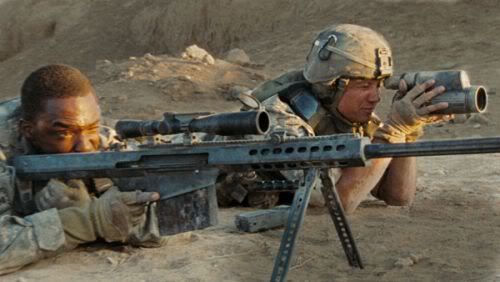
My chief complaint about the film is that it goes too far with this view. Besides a scene with a team of mercenaries, the team is alone outside the wire constantly. Civilians can overlook that, but those with field experience might be rolling their eyes at yet another scene involving James cutting the right wire just in time. I've seen dozens of controlled detonations, and I can't think of any that had an EOD tech waltzing up to the bomb to clip wires. That's what the robot is for. It does happen, but not as frequently as the writer has you believe.
In one of the final scenes, the team is called out to assess the damage of a VBIED detonation. James spots a possible escape route for the triggerman, and in a wildly implausible decision, takes his team into three separate alleys in the dead of night. Shockingly, one of the men is nearly carted off by militants. Instead of a close call changing the way James thinks about his leadership, he keeps on with his reckless self. In the end he learns nothing. Of course, who knows what happens when he comes back to the FOB to find a stack of Article 15s.
I don't think it was out of neglect that such unrealistic moments crept into a generally realistic movie. I applaud the efforts of the technical advisers that worked on this film. The movement of the soldiers, particularly inside an IED factory, was textbook perfect. They operated in concert, double clearing hallways and moving with an air of urgency and flow. Combat scenes from
Home of the Brave and
Redacted looked like they were filmed in Brian de Palma's backyard.
The Hurt Locker, filmed in Jordan, has an authentic feeling that is light years ahead of any Iraq movie released. They nailed the environment, the crushing paranoia of watching Iraqi bystanders eyeballing you, everything.
Toward the end of the film, James is back home, crippled with Sudden Civilian Syndrome. He gazes at a wall of breakfast cereals in a grocery store, confounded about the sheer amount of choice. It is here where we see James suffering from combat withdrawal. In Iraq he was on his game, disarming bombs with a few snips. The EOD suit he wears is his real skin. When it comes off, he's an alien on a planet he doesn't understand. As he explains to his infant son, there is only one thing he loves in the world. His body is home safe, but his heart and mind are still in the desert.
The (few) criticisms I've read are largely without merit. From Breitbart's Big Hollywood, dueling bozos of bromance
Alexander Marlow and
John Nolte both decry the characterization of Iraqis in the movie. This is a part of the narrative that should follow reality as close as possible, and it succeeds for the most part. Outside the wire, you shake kid's hands, you kick around a soccer ball and you act like a decent human being. But not for one second should your guard come down when it comes to the locals. Nolte feigns outrage about a scene involving a taxi driver running a roadblock. After a tense standoff, a soldier takes down the driver and violently handcuffs him. With what I imagine is a straight face, Nolte takes umbrage with the quote, "If he wasn't an insurgent, he sure as hell is now." Man, that was a favorite joke of mine! I said that about a man who owned a courtyard where I found two Molotov cocktails. Moments before he opened his trunk for us. It was full of whiskey, a rarity to see in a Muslim country. We laughed and pretended to stumble around drunk, but after I found those cocktails and the IP shoved his face into a brick wall, we weren't laughing anymore. I joked that next time, there would be a spring loaded boxing glove that came out.
Nolte doesn't realize that most people weren't too happy to see us, or consider the possibility that combat operations are a societal irritant. No, that is too complex a notion. He just decides to phone it in as a liberal slight and call it a day. There must be a shortage of veterans in West Hollywood (tip: if someone describes their residence with a cardinal direction, they probably have a gargantuan chip on their shoulder). Nolte could have passed his hissy fit about Iraqis to someone who knew what they were talking about. Quoth the Noltmeister: "The [Iraqi] men are alternately terrorists, a menacing presence, victims, the butt of jokes or utterly clueless." The movie is about guys who go find bombs buried in the road. What kind of person lingers around that environment John? You guessed it. Terrorists, menacing civilians, victims and clueless people.
I can agree with Marlow and Nolte that the order from a full bird to let an insurgent bleed to death is out of place, poorly staged and irrelevant to the plot. I could see what they were going for, but it translated horribly to the screen. Things like that do happen,
as some of you might remember (long story short: we watched some insurgents bleed to death, and we watched a blindfolded guy die in slow agony after his house exploded and
fell on top of him). A field grade officer ordering his men to let an insurgent bleed out is over the line though, and should have been left on the cutting room floor.
It's a shame some people can't look past their narrow view to enjoy the best Iraq movie to date. Though flawed with a serious case of the WTFs,
The Hurt Locker more than makes up for it with technical prowess and unbelievably tense moments. In the only theater in Austin currently playing the movie, I heard a steady stream of gasps and "Oh shit!" moments in a nearly packed house. That kind of audience involvement is a testament to how well crafted the story is, regardless of the basic absurdity of the plot. General moviegoers will have plenty to rave about, and seasoned vets can walk away satisfied if they willfully suspend their disbelief for a couple of hours. I'm sure your wife or girlfriend won't mind that you stop whispering "That totally wouldn't happen" every five minutes.
Final Verdict: 3 1/2 Burning Cars out of 5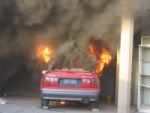



Update: West Hollywood is a town apart from Hollywood? Holy crap. I guess H-Town reached critical mass of people like John Nolte. A Manifest Douchery, westward to the sea!
